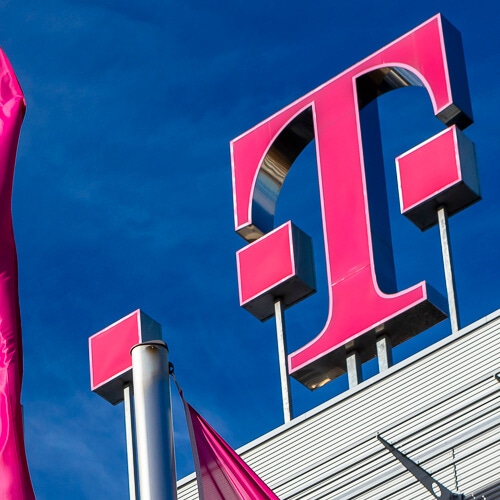
Deutsche Telekom (DT) again produced a broadly positive set of results for the second quarter (Q2) of 2021, with T-Mobile US still the darling of the group and T-Systems remaining the problem child, albeit with some light at the end of the tunnel.
The Germany-based group was confident enough to raise its profit outlook for the second time this year. Reuters noted that revenue and earnings beat analyst expectations, even as a weaker dollar weighed on its reported results.
DT said it now expects adjusted core profit to reach €37.2 billion (US$43.7 billion) this year, up by €200 million ($234 million) from its previous guidance in May. Jefferies analysts noted that DT has managed to maintain momentum, and pointed out that the revised outlook reflects the increased guidance at T-Mobile US, which reported its Q2 results on July 29.
Figure 1:  Flags flying: Deutsche Telekom's Q2 results comfortably beat analysts' expectations, with T-Mobile the star of the show.
Flags flying: Deutsche Telekom's Q2 results comfortably beat analysts' expectations, with T-Mobile the star of the show.
(Source: Deutsche Telekom)
Group Q2 net revenue rose 6.8% year-on-year to €26.6 billion ($30.5 billion) when adjusted for changes in the composition of the group and exchange rate effects. Adjusted EBITDAal increased 1.1% to €9.4 billion ($11.03 billion).
On a reported basis, the results were adversely affected by a weaker US dollar compared with the prior-year period: Revenue was down by 1.7% and adjusted EBITDAal fell by 4.2%. The net profit for the quarter was reported at €1.87 billion ($2.19 billion), or €2.11 billion ($2.47 billion) when adjusted for special factors.
In the first half of the year to the end of June 2021, revenue increased 12.8% to €52.98 billion ($62.18 billion) and adjusted EBITDAal rose by 14% to €18.66 billion ($21.90 billion). When adjusted for special factors, the net profit rose almost 30% to €3.32 billion ($3.89 billion).
Contributions from both sides of the pond
DT noted that T-Mobile US in particular contributed to the positive revenue trend with an increase of 20.7% to over €33 billion ($38.7 billion) in the first half of the year.
When adjusted for the effect of the acquisition of Sprint and assuming constant exchange rates, revenue increased by 10.1% year-on-year. In Germany, revenue was up on the prior-year level, increasing by 1.4%.
The Europe operating segment generated total first-half revenue of €5.6 billion ($6.57 billion), a year-on-year increase of 1.6%. In organic terms, revenue increased by 2.4%.
Speaking during the earnings calls (via an interpreter), Timotheus Höttges, CEO of DT, said the positive development is mainly owing to two major factors.
"First of all, the business combination of T Mobile US and Sprint in the United States continues to make excellent progress," he said.
"Secondly, operations on this side of the Atlantic are also developing very favorably. Adjusted EBITDAal grew by 4.5% in organic terms in the first six months, and I am particularly pleased to see that all group units are contributing to this trend, without exception."
T-Systems, the group's enterprise services unit that is still undergoing a major reorganization, continued to show revenue decline, dropping 5.5% to €1 billion ($1.17 billion) in Q2.
However, DT noted that EBITDAal increased by €1 million ($1.17 million) to €72 million ($84.5 million). On a more positive note, T-Systems recorded stronger new business in Q2. Order entry rose by 25.3% to €1.1 billion ($1.29 billion) compared with the same period of the prior year, which DT said was driven primarily by a deal in the automotive sector.
Christian Illek, group chief financial officer, said the development at T-Systems had been encouraging, and noted that the major customer cited above brought in €350 million ($410.8 million) per year. He said the decline was due to the traditional infrastructure business, but said the group has been able to stabilize the situation through cost management.
DT has continued to cut job cuts in the name of efficiency – 2,476 since March and 4,382 since December 2020, leaving it with a workforce of 221,909 employees at the end of June. In Germany, the number of employees decreased by 6.9% compared to the end of 2020.
The group said this was mainly as a result of the reassignment of employees to the group HQ and services segment in connection with reorganization measures at Deutsche Telekom IT.
Ramping up, rolling out
In terms of network build, Höttges said: "In the first half of the year, we rolled out [FTTH] to around 340,000 households in Germany … and our goal is still to achieve 1.2 million [additional] lines by the end of this year. We are well on track to achieving this."
A total of around 2.5 million households in Germany were connected to the FTTH network as of the end of June 2021.
In February, Höttges said DT was focusing on accelerating deployment to 2.5 million per year by 2024, which would put it on track to reach ten million households by the end of that year.
Want to know more about 5G? Check out our dedicated 5G content channel here on Light Reading.
Höttges reiterated the aim to cover all German premises with fiber-to-the-home (FTTH) networks by 2030, and again called on rival providers to help it achieve that goal.
"We will make a major contribution to achieving this goal, which we've repeated over and over, but the other portion has to come from our competitors. We cannot digitize Germany on our own, much as we would like to," he said.
In terms of the mobile network in Germany, DT switched off its 3G network at the end of June and began using the freed-up spectrum for 4G and 5G. In Q2 2021, it upgraded over 800 additional sites for 5G and now provides 5G coverage to 82.4% of German households.
Related posts:
— Anne Morris, contributing editor, special to Light Reading
Read more about:
EuropeAbout the Author(s)
You May Also Like












